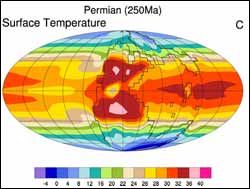
Scientists at the National Center for Atmospheric Research (NCAR) have created a computer simulation showing Earth’s climate in unprecedented detail at the time of the greatest mass extinction in the planet’s history. The work gives support to a theory that an abrupt and dramatic rise in atmospheric levels of carbon dioxide triggered the massive die-off 251 million years ago. The research appears in the September issue of Geology.
“The results demonstrate how rapidly rising tem
New databases give researchers a look into processes inside the Earth’s mantle
Researchers at Columbia University’s Lamont-Doherty Earth Observatory recently resolved a long-standing contradiction about the workings of the deep Earth. For years, many geochemists have argued that parts of the deep mantle remain unchanged since the formation of the Earth, whereas many geophysicists and geodynamicists have held that the entire mantle has been convecting (moving and mixing) over geo
New images suggest that the Earth’s lower oceanic crust is generated from multiple magma sources
Some of the highest quality images ever taken of the Earth’s lower crust reveal that the upper and lower crust form in two distinctly different ways. A team led by researchers from Columbia University’s Lamont-Doherty Earth Observatory will publish the results of their work in the August 25 issue of the journal Nature.
The Earth’s oceanic crust is formed from magma bodies lo
The current warming trends in the Arctic may shove the Arctic system into a seasonally ice-free state not seen for more than one million years, according to a new report. The melting is accelerating, and a team of researchers was unable to identify any natural processes that might slow the de-icing of the Arctic. Such substantial additional melting of Arctic glaciers and ice sheets will raise sea level worldwide, flooding the coastal areas where many of the world’s people live.
The 3 day July whale and dolphin theme cruises in the Bay of Biscay produced sighting of 11 different species of whales, dolphins and porpoises – an impressive record for anywhere in the World.
The Biscay Dolphin Research Programme (BDRP) is at the forefront of scientific research into cetaceans (the collective term for whales and dolphins) in the Eastern European Atlantic and as part of its education role, the charitable organisation also operates a selected number of eco-touris
Researchers at Oregon State University and Diversa Corporation have discovered that the smallest free-living cell known also has the smallest genome, or genetic structure, of any independent cell – and yet it dominates life in the oceans, thrives where most other cells would die, and plays a huge role in the cycling of carbon on Earth. In nature, apparently, bigger is not always better.
In a publication today in the journal Science, scientists outlined the growing knowledge about S